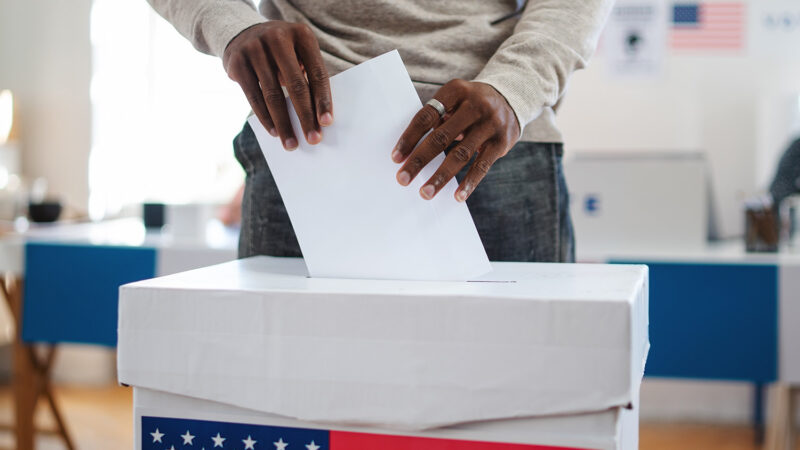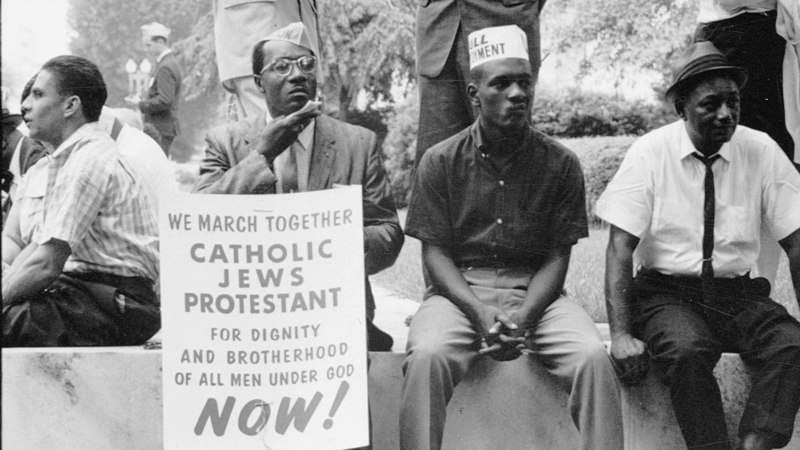Alexandra Chandler oversees Protect Democracy’s teams that protect free and fair elections and the infrastructure for electoral competition at the national and state levels, as well as national security policy and advocacy.
Undermining Free & Fair Elections: An Update on the Risk of Election Crises Since November 2020
- July 14, 2021

The mission of the National Task Force on Election Crises is to prevent election crises whenever possible, and to prepare to respond to and mitigate crises when they do occur. That mission remains as critical today as it was during the 2020 presidential election. In fact, the Task Force considers the risk of crises threatening future elections in this country to be dangerously high.
The 2020 election was among the most challenging in modern history — beset by a global pandemic, civil unrest, and unprecedented attacks on our democratic institutions. The country managed to make it through more than one crisis, conducting a secure election and ensuring a successful (if not entirely peaceful) transition of power. But there were — and continue to be — important lessons to be learned.
In January the Task Force released Strengthening our Elections and Preventing Election Crises: Lessons and Recommendations from the 2020 General Election. Since then the country has made some progress consistent with the Task Force’s recommendations. But some lawmakers, particularly at the state level, have proposed (or even enacted) changes to election laws driven by a false belief among part of the electorate that the 2020 election was somehow stolen.
Any legislative activity premised on lies and conspiracy theories is deeply concerning. But recent efforts by highly partisan state legislatures to interfere in election administration in a way that may disrupt the conduct of elections or allow for manipulation of election outcomes pose a particularly acute risk of future crises. Combined with a failure to address critical weaknesses in our election systems and protect election workers, as well as a failure to address the root causes of the January 6th insurrection, these efforts are a threat to the very foundation of our democracy.
This report highlights some of the most concerning trends that have developed in recent months and the critical reforms that are needed to protect our elections in 2022 and after.
Interference in Election AdministrationINTERFERENCE IN ELECTION ADMINISTRATION
Since November, we have seen some positive developments at the state level in the form of legislation intended to improve election administration and increase voter access, and to address some of the lessons learned from 2020. Kentucky, for example, stands out as an example of productive, bipartisan lawmaking. The state recently enacted legislation to increase voting options and election security (at least as compared to pre-pandemic elections), including an expansion of early voting, an online portal for requesting a mail-in ballot, and a gradual transition to voting systems that guarantee a paper ballot trail.
Likewise, a number of states have taken steps to address the specific challenges that arose as a result of the time it took certain jurisdictions to report election results in November. Louisiana, for example, recently enacted (on a bipartisan basis) a law that allows parishes to process absentee and early voting ballots three days before an election with approval from the secretary of state.
The Pennsylvania legislature also passed a bill that would have allowed election administrators to begin processing ballots five days before an election. While these are relatively modest amounts of time (e.g., North Carolina allows ballots to be processed the fifth Tuesday prior to Election Day and counted two weeks before Election Day), they are a step in the right direction. Similarly, both Nevada and Vermont expanded mail-in voting (the latter on a bipartisan basis). And Indiana, Massachusetts, Maryland, New Jersey, Oklahoma, and Virginia joined Kentucky in extending early voting options, while several more states are considering doing so.
But competing with these positive developments is a wave of legislation that would restrict voter access or create new openings for partisan disruption or manipulation of election administration and, potentially, election outcomes. Some of the bills in the latter category of legislation — through which state legislatures might arrogate or otherwise alter the role that experienced state and local election officials have had in conducting elections — pose an especially urgent threat of future election crises.
In particular, state legislators have proposed more than two hundred bills in 41 states that have the potential to allow those legislators to interfere with election administration in one way or another, and at least two dozen bills have already been passed into law. In Georgia, for example, the omnibus election bill that passed in March (S.B. 202) included a provision that replaced the secretary of state as the chair of the State Elections Board with one selected by the state legislature. It further gave both the statewide board and county commissions new authority to replace local election officials under certain conditions.
At the most extreme end, legislators in a few states have proposed laws that might allow them to directly overturn election results they disagree with in the future. For example, a bill in Arizona provides that “by majority vote at any time before the presidential inauguration [the legislature] may revoke the secretary of state’s issuance or certification of a presidential elector’s certificate of election.” Similarly, a bill in Missouri would allow the legislature to “retain its authority to name presidential electors in cases of fraud” or if a court or the executive branch interfere in election administration (leaving it to the legislature to make such determinations itself). While not all of these efforts to change election administration are as significant in scope or likely impact as others (and many are unlikely to become law), they are part of a concerning trend of legislative responses to the outcome of the 2020 election in
some states.
Finally, also included among these bills are ill-conceived (at best) proposals to impose criminal and civil penalties on election administrators who make common, unintentional errors or deviate in any way from established policies and procedures. Troublingly, several states (Arizona, Arkansas, Indiana, Iowa, Kansas, and North Dakota) have already passed some version of such legislation into law.
By further opening the door to partisan manipulation of election administration, this wave of legislation threatens not only to undermine confidence in our elections, but to actually undermine the integrity of election outcomes.
Threats of Violence Against Election Volunteers and OfficialsTHREATS OF VIOLENCE AGAINST ELECTION VOLUNTEERS & OFFICIALS
One of the most concerning trends coming out of the 2020 election was the volume and intensity of threats of violence against election officials, administrators, and volunteers (and, in some cases, their families). In fact, we are still learning just how grave the situation was — and continues to be, as recent reporting makes clear the extent to which right-wing extremists in particular have “terrorized” election workers.
The result of these threats (and other pressures) has been an unusually large number of election officials resigning or retiring this past year. And yet, despite proposing hundreds of bills addressing other aspects of election law, few (if any) state legislatures have taken up this issue.
The Task Force renews its call for federal and state governments to strengthen laws specifically to protect election workers from this sort of intimidation and to more aggressively enforce existing laws.
Partisan Election Reviews & InvestigationsPARTISAN ELECTION REVIEWS & INVESTIGATIONS
Notwithstanding the fact that the integrity of the election results in key battlegrounds states has been confirmed through a variety of professional audits and/or recounts (as well as a record number of unsuccessful legal challenges, several state legislatures are now pursuing their own so-called “audits” and other investigations. These reviews are being promoted, and in some cases conducted, by the very same people who have continued to spread conspiracy theories and other falsehoods about the election since November. While these efforts are nominally framed as an effort to learn lessons from 2020 rather than attempts to overturn the results, the way they are being conducted is cause for serious concern. Thus, the problem is not that some state legislatures are calling for further reviews of the election — rather, it’s that they are pursuing partisan processes that lack transparency, professional standards, and adequate safeguards for the security of ballots and election data and equipment.
Arizona was the first state to head down this path, and the deeply troubling nature of the ongoing process there is well-documented. But a number of other states are beginning to follow suit, including Georgia and Wisconsin. And legislators and others from at least eleven states, including Pennsylvania and Michigan, have made trips to Arizona to observe and learn from the process.
There is certainly room for good-faith bipartisan efforts to improve the process of auditing elections in the future in a way that actually increases public confidence. Likewise, the recent proliferation of unprofessional, partisan election reviews has highlighted the need for stronger rules around the custody and preservation of ballots, voting machines, and other election materials (whatever the content in which they are being reviewed). The Task Force urges state lawmakers to focus on such reforms rather than pursuing ill-conceived efforts that will serve only to undermine confidence in our elections.
Insufficient Funding & Election InfrastructureINSUFFICIENT FUNDING & ELECTION INFRASTRUCTURE
As the Task Force noted in January, funding and infrastructure are crucial to ensuring that our elections are secure and resilient in the face of future crises. State and local governments must make steady investments in the people, processes, and equipment necessary to conduct elections. It is also critical that Congress provide adequate, consistent funding for election administration to supplement state and local funding. At the same time, officials at all levels should use the lessons learned this past year to evaluate whether institutions like the U.S. Election Assistance Commission and the Cybersecurity and Infrastructure Security Agency, and related structures, can be improved to better prepare for and respond to future challenges.
Weaknesses in Federal Law Specific to Presidential ElectionsWEAKNESSES IN FEDERAL LAW SPECIFIC TO PRESIDENTIAL ELECTIONS
In January, the Task Force recommended amending both the Electoral Count Act and the Presidential Transition Act. Both continue to be important opportunities for bipartisan reform. The Electoral Count Act in particular is a critical component of the reforms necessary to avoiding an electoral crisis in 2024, and should be a priority in Congress now, well before the 2024 political landscape begins to take form.
Accountability for the January 6th InsurrectionACCOUNTABILITY FOR THE JANUARY 6TH INSURRECTION
The Task Force is deeply disappointed that in the face of a violent attack on our nation’s capital, Congress has not undertaken a bipartisan effort to understand the root causes. This inability to come to agreement on a bipartisan Commission only reinforces the severity of the crisis our democracy is in and the growing need to enact critical reforms at the state and federal levels.
ConclusionCONCLUSION
The need to strengthen our electoral system and guard against crises is even more urgent than it was several months ago. Since November 2020, attempts to subvert our electoral system have become increasingly brazen (even violent) as one democratic norm after another is challenged, and the risk that future elections will be undermined has therefore increased. The Task Force urges policymakers, legislators, and other stakeholders to heed the lessons we learned this past year and undertake much-needed reforms to secure the future of free and fair elections. The future of our democracy depends on it.
Related Content
It can happen here.
We can stop it.
Defeating authoritarianism is going to take all of us. Everyone and every institution has a role to play. Together, we can protect democracy.
Donate
Sign Up for Updates Sign Up for Updates
Explore Careers Explore Careers
How to Protect Democracy How to Protect Democracy




